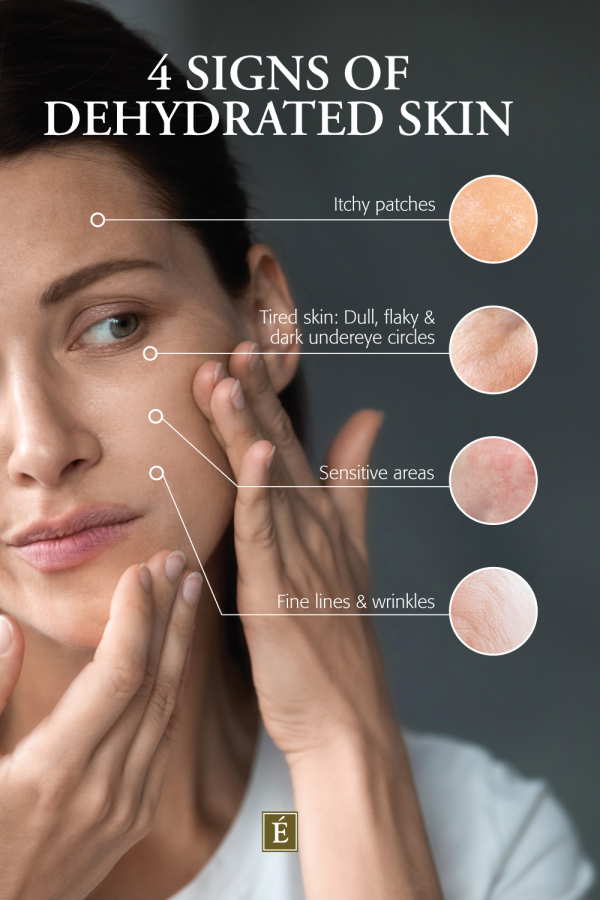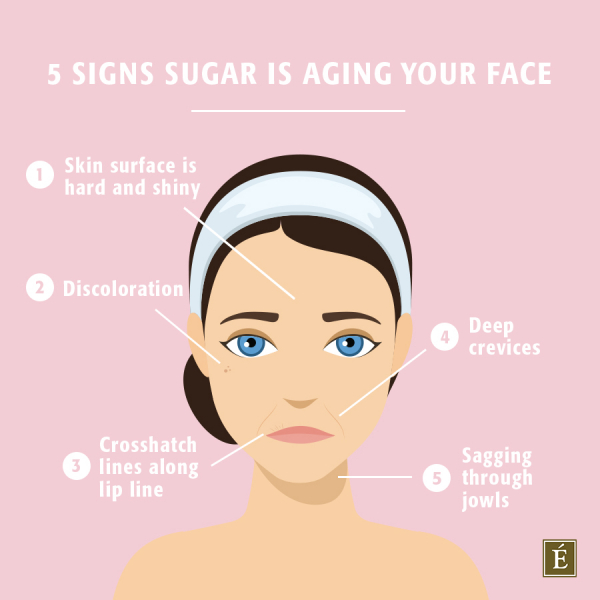4 Signs Your Skin Is Dehydrated & How To Fix It
Does your skin feel more flaky and sensitive than usual? Has your natural glow been zapped by your complexion? If this sounds like the condition of your skin, it may be dehydrated. Here are the top signs of dehydrated skin and our recommendations on how to fix them.
What is the difference between dry and dehydrated skin? | 4 signs of dehydrated skin | How to fix dehydrated skin
What is the difference between dry and dehydrated skin?
Dry and dehydrated skin have many of the same signs and symptoms, but they're actually quite different. Here's a quick breakdown of how these two skin care problems differ:
Dry skin
Dry skin is classified as a skin type and is inherited through your genetics. Skin Inc defines dry skin type as one that is prone to insufficient production of the skin's natural oils. Dry skin can also be associated with hormonal imbalances or an underactive thyroid. This can slow down your skin's production of sebum and contribute to a dry and dull complexion. While your dry skin type cannot be genetically modified, adding oily products to your skin care routine can improve its appearance.
Dry skin
Dehydrated skin, on the other hand, is a skin condition. It is caused by external influences (weather and seasonal changes), unhealthy diet (lack of fresh produce) and lifestyle choices (alcohol or caffeine consumption). All of these factors reduce the water content of your skin, which leads to a less supple appearance. One important finding is that dehydration is characterized by a lack of water – not oil; even oily skin types can dry out. Fortunately, dehydrated skin is temporary and can be alleviated through a combination of topical treatments and lifestyle changes.
4 signs of dehydrated skin
Not sure if you are dealing with dryness or dehydration? Here are four tell-tale signs that you have dehydrated skin:
1. Itchy skin
Have you ever returned from a ski vacation or a day at the beach and felt the relentless need to scratch yourselves? External elements such as wind and extreme temperature changes can draw moisture away from the outer layer of the skin and cause a tense, itchy feeling. This is often accompanied by peeling, regardless of the amount of oil on the surface of your skin.
2. Increased sensitivity
One of the biggest consequences of dehydrated skin is an increase in sensitivity. If the moisture barrier of your skin is disturbed, it cannot protect itself properly against external environmental influences. As a result, irritants such as bacteria and pollution can penetrate the outermost layer, making symptoms such as redness, itching, and irritation worse.
3. Matte skin
Overall, does your skin look dull and tired? Dehydration affects your skin's ability to perform important functions such as cell turnover. Without adequate hydration, your skin will not lose its outermost layer often enough and dead cells will build up on its surface. This contributes to clogged pores, congestion, and a dull complexion.
4. Fine lines & wrinkles
“Gently pinch the skin on your cheek. If it looks like you have fine lines, you are dehydrated, ”advises skin care professional Joanna Vargas. Dehydrated skin often shows accelerated signs of aging; In contrast to laugh lines or crow's feet, however, these wrinkles appear as a network of tiny, triangular folds.
How to fix dehydrated skin
Before we outline a skin care routine, let's first explore some other lifestyle tips that might help you.
1. Avoid caffeine and alcohol
Caffeine and alcohol are two of the worst culprits for dehydrated skin. Both substances are diuretics that affect the health of your skin by breaking down the water content. And alcohol doubles in size by inhibiting the production of the hormone vasopressin, which is essential for rehydration. If you can't imagine getting through the day without your morning latte, don't be afraid: one to two cups of coffee a day and a glass of alcohol in the evening are generally accepted.
2. Best products for dehydrated skin
To repair dehydrated skin, you need to address your skin care routine and overall health. This means hydrating from the inside out as well as treating the dehydration topically.
3. Buy a humidifier
You may need to add moisture to the air and turn off the air conditioner. Humidifiers are usually very quiet and work in the background by evaporating water through a heating element. They create steam that is released into the air, creating moisture and moisture to help people with dehydrated skin.
4. Skip harsh facial scrubs
Exfoliating is a safe way to lighten dull, dehydrated complexions, but if you have dehydrated skin, we recommend avoiding gritty scrubs, which could irritate the skin. Healthy skin takes 25 days to naturally renew itself, and dehydrated skin takes longer. Proper exfoliation speeds up skin cell turnover by removing dead cells from the surface to reveal the new, healthy cells underneath. We've recommended a gentler skin care exfoliating option below.
A routine for dehydrated skin
To repair dehydrated skin, you need to address your skin care routine and overall health. This means hydrating from the inside out as well as treating the dehydration topically.
1. Wash with a gentle detergent and lukewarm water
The best way to cleanse dehydrated skin is with a gentle cleanser and lukewarm water. Choose detergents that are free from harsh chemical additives and artificial fragrances that can draw soothing moisture out of the skin and increase sensitivity. At Eminence Organics, we select only the best organic ingredients and keep our skin care products free of harmful chemicals such as parabens, petrolatum, mineral oils, propylene glycol and sodium lauryl sulfate. To cleanse dehydrated skin, we recommend using a product like Wildflower Cleansing Balm or Stone Crop Cleansing Oil, which gently melt away impurities, moisturize the skin and leave no residue.
2. Apply an essence
Skin care that you shouldn't do without – especially for dehydrated skin – is an essence. This K-Beauty staple maximizes hydration, replenishing moisture, and protecting skin from the drying effects of environmental stressors. Facial essences are packed with deeply moisturizing and antioxidant ingredients that work wonders on dehydrated skin. Take our birch water cleansing essence as an example. This light essence contains snow and reishi mushrooms to moisturize the skin and neutralize the drying and aging effects of free radicals.
3. Use a hyaluronic acid serum
Hyaluronic acid is extremely effective in replenishing dehydrated skin. As a humectant, this miracle active ingredient helps to bind and store moisture and keeps the skin soft and cozy. According to ELLE, hyaluronic acid has the ability to hold up to six liters of water and "acts like a magnet for moisture, helping your cells to store as much of it as possible so your skin feels and appears hydrated, plump and healthy". At Eminence Organics, we infuse botanical hyaluronic acid into deeply moisturizing serums like our Strawberry Rhabarb Hyaluronic Serum and Firm Skin Acai Booster Serum.
4. Use a gentle scrub
As mentioned earlier, avoid harsh peels that contain pearls or sugar. Instead, opt for a gentle scrub like our strawberry-rhubarb dermafoliant, which uses rice and chickpea flour to gently remove flakes and dead skin. Strawberry is a natural detergent and astringent that contains salicylic acid. Salicylic acid exfoliates and removes impurities to lighten the appearance of the skin and shrink the appearance of pores.
5. Protect the outer layer of your skin
The judges aren't sure if drinking eight glasses of water a day will dramatically improve the hydration of your skin. Dermatologist Joel Schlessinger Explains Reader's Digest, "Drinking water all day is great for your body, but that moisture doesn't really reach your skin unless you're extremely dehydrated." The key is to keep water from leaving your skin by keeping the moisture barrier intact and healthy. One of the best ways to achieve this is with a topical treatment like our Marine Flower Peptide Night Cream. This rich formula contains botanical peptides (from rice protein) which means that it is plant-based and naturally derived. Jojoba oil locks in moisture and prevents transepidermal water loss so you can expect a change in your skin with a more hydrated, firmer look.
We also recommend our Lotus Detoxifying Overnight Treatment, which uses jojoba oil to lock in moisture and prevent transepidermal water loss.
Is your skin dry or dehydrated? We'd love to hear your lifestyle or skin care tips and tricks to keep your skin looking its best. Let us know in the comments below and join the conversation on social media.
This post was originally published in March 2016.







